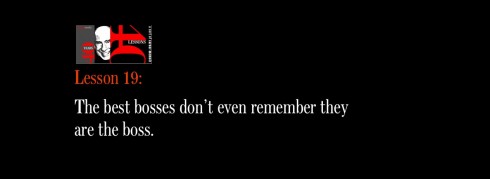TAKEAWAY: This is part 19 of my occasional series 40 Years/40 Lessons, which I call a “sort of career memoir” capturing highlights and reminiscing about what has been a spectacular journey for me, doing what I love most. Today’s segment: all about the role of the “boss”.

Illustration by Ana Lense Larrauri/The Miami Herald



Lou Grant (Ed Asner) remains one of TV’s most memorable bosses: a combination of stern, funny, compassionate and proud of his team. Here seen with the show’s star ,Mary Tyler Moore. Definitely one of TV’s best written sitcoms, a classic still today.
(Photo from greginhollywood.com)
This may be the shortest of these 40 Years/40 Lessons’ segments. Why? Well, because the premise or the lesson about being a boss can be summarized in a sentence:
The good bosses act as if they aren’t.
Perhaps I will rephrase that: it is NOT so much acting like one is not the boss, but not letting the “boss” definition affect how one treats those under our supervision.
Yes, I am a boss to some, and have been for years.
I was reminded of this last week while dining with Reed Reibstein, our art director/project manager, and the last person I hired to join our team. We were discussing email punctuality, and how some people procrastinate and let them pile up.
“Well, sometimes I am guilty of that myself,” Reed said.
“Not really, Reed. You are very punctual with your emails to me,” I answered.
“Well, you are my boss!,” he responded.
Boss, that is me, I guess.
Me the boss?
However, it is not a title that I think about, wear on my sleeve, or have any particular affection for. The best bosses I have met never “trained” to be bosses. It just happened, and they adapted to do it as best they could.
Bosses appear early in our lives: as in that first job babysitting, or cutting the neighbor’s grass. That is usually our first interaction with The Boss. Those experiences are likely to shape how we react to bosses, and how we act as bosses when the time comes for us to step into that role.
My first bosses
If I must take myself back to the first bosses I sampled, they would have to be those television directors who instructed me on everything from how to move, how to talk and how to interpret a line for a soap opera, play, film or commercial. I was a child actor then, barely 10 years old, so the boss/employee relationship may be a little different here, but, nonetheless, it was the beginning of what the boss/employee ritual is all about:mutual respect, following directives, punctuality and just plain responsible behavior. I still go by that, expect it from those who work with me, and keep it in focus as I perform the duties of the boss with my team.
My experiences with those early bosses? There was the micro manager director who told me to scratch my head at a certain point in a scene, the one who was on top of the most minute detail; there were the bosses who explained the scene and let me give it my own twist; there were those who arrived late on the set, were not well regarded by the other actors, and improvised, sometimes with good results, sometimes not. I think I have captured the three types of universal bosses here. A little bit of each goes a long way, I think.
I fit into the one in the middle, I think: provide the foundation for the idea, let the designer execute it, offer his take and, more often than not, surprise me with the results.
Once I arrived in Miami, I was suddenly thrusted out of the creative mode that is acting and into that of a restaurant kitchen in downtown Miami, playing the role of the bus boy. No need for improvisation, just be quick clearing out the tables, get them ready for the next customer, pile the dirty dishes here, the dirty glasses there, and the cutlery on the right. Presto. The boss was a bit intimidating (perhaps to a scared 14 year old refugee), dictatorial, and thought he was king of the 99 cent blue plate special lunch. Of course, I have met many bosses like that in the past 40 plus years, out of the kitchen, and in the newsrooms, kings of the tabloids, or kings of the fashion magazine. A bit despotic, very full of themselves, they go around intimidating and command little respect. They make people working for them curse, or cry, or hit a door. Not a good thing.
However, if my experience is an indicator, the good bosses outnumber the mediocre ones. And some of the bad ones are not despotic or tyrannical, they simply were GOOD at what they did for the craft, but have no management skills. Unfortunately, the reward in the business world (and in education) is to give a managerial role to those who are very good. Big mistake. However, it is here that knowing oneself and what one is good at helps. Even if the money is better, it is sometimes better to turn down the “boss’s” job and stick with the doing part. Not everyone should manage people.
God, how I wish more top managers would remember that.
So what are the good qualities of the good bosses?
1. They trust those with whom they form a team. If a person is in your team, train them to be part of it and then trust them. If not, the best thing one can do is to terminate that person, who may find greener pastures elsewhere. Worse than being fired, is to be retained in a position where the boss does not trust you. Believe me!
2. They are transparent in their views, expectations and visions of how they expect things to work. Every good boss has an unwritten protocol for his department. His team not only understands it, but has memorized it and applies it. This is what gives a boss’s vision form and shape.
3. They don’t play favorites. Instead, they realize the value of each member of the team, study their strengths and weaknesses and assign them tasks accordingly.
4. They are clear about their goals and expectations. No member of their team ever appears to work totally confused with the boss’s expectations.
5. They give proper credit to each member of the team. The best teams include major contributions from each member. It is up to the boss to let that person with the bright idea which has made the project so much better have his/her moment to take a bow.
I have observed marvelous bosses in action, and for that I am grateful. Their organizations thrived. Their publications succeeded.
In today’s media environment, it is tougher to be a good boss, because the boss on top of the boss is applying the pressure for performance. We all know how difficult it is to perform when the performance itself becomes the main issue.
Yet, as I visit newsrooms on a weekly basis I see incredibly successful bosses who inspire, trust and remind their teams of the “tough times” while turning the challenges into opportunities for creativity and innovation.
These are the bosses that when presented by their team with a Why Don’t We type of scenario, usually respond, Why Not?
Mario the boss
As for me, I do supervise the work of several in our Garcia Media group of very talented people. I am proud to say that the majority have been with me for an extended period of time. I have the greatest respect for all of them, listen to their ideas, and they know that in this organization, the boss’ mantra is: Let the best idea win, regardless of who it came from.
It has served us well.
No team is perfect, and I am aware that I am quite demanding of the wonderful people I work with and supervise. My assistant of over 20 years, Toni Lewis, often reminds me that the work is intense, and that I need to clone myself.
No such thing, I tell her.
“But, the Garcia train moves at fast speed and we all know it,” she reminds me.
We do move fast, and perhaps the bossiest part of me is that I expect members of my team to hop on that train and move at my speed. I expect punctuality, responsibility and accountability. This is transmitted with a smile, and we seldom have to remind anyone in the team about this.
No boss is perfect, and the good ones make each day a learning experience. One thing is for sure, the best bosses always remember when they were not the boss. They don’t even remember that they are. Carrying out the duties of the boss can be so much nicer and easier when one is not wearing that boss’s cap all the time. Sort of “do unto others….”
And I now realize that this is the most I have ever thought about the subject of being a “boss”, and I would like to keep it that way. Let me continue to go through my day spending more valuable (and fun) time in the creating than in the bossing.


1.Mirrors.
https://www.garciamedia.com/blog/articles/40_years_40_lessons_1—a_look_in_the_mirror
2.Refugee.
https://www.garciamedia.com/blog/articles/40_years_40_lessons_2—refugee
3.Teacher.
https://www.garciamedia.com/blog/articles/40_years_40_lessons_3—teacher/
4.Mentors.
https://www.garciamedia.com/blog/articles/40_years_40_lessons_4—mentors/
5.Consultant.
https://garciamedia.com/blog/articles/40_years_40_lessons_5—consultant/
6.Eagle.
https://garciamedia.com/blog/articles/40_years_40_lessons_6eagke
7.Abroad.
https://garciamedia.com/blog/articles/40_years_40_lessons_7._abroad
8. Books
https://garciamedia.com/blog/articles/40_years_40_lessons_8_books
9. Luck
https://garciamedia.com/blog/articles/40years_40_lessons_9_luck
10. Positive.
https://garciamedia.com/blog/articles/40_years_40_lessons_10positive
11. Culture
https://garciamedia.com/blog/articles/40_years_40_lessons_11_culture
12.Adapting.
https://garciamedia.com/blog/articles/40_years_40_lessons_12_adapting1
13.Dreams.
https://www.garciamedia.com/blog/articles/40_years_40_lessons_13_dreams
14. The Pitch.
https://www.garciamedia.com/blog/articles/40_years_40_lessons_14_the_pitch
15.. Ethics.
https://garciamedia.com/blog/articles/40_years_40_lessons_15_ethics/
16. Time.
https://garciamedia.com/blog/articles/40_years_40_lessons_16_time
17.Pause.
https://garciamedia.com/blog/articles/40_years_40_lessons_17_pause/
18.Stories.
https://www.garciamedia.com/blog/articles/40_years_40_lessons_18_stories
Of special interest this Monday
Apple delays delivery of new iPad
https://mail.google.com/mail/?shva=1#inbox/136031aaafb2d9d2
First paragraph:
Apple’s new iPad 3 is sold out and delivery of the new mobile tablet has been delayed because of the overwhelming demand.